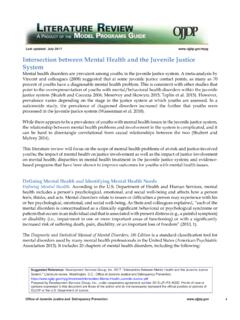Transcription of MENTAL HEALTH AND PRISONS - World Health …
1 INFORMATION SHEET. MENTAL HEALTH AND PRISONS1. THE CHALLENGE. MENTAL disorders occur at high rates in all countries of the World . An estimated 450 million people World wide suffer from MENTAL or behavioural disorders2. These disorders are especially prevalent in prison populations3. The disproportionately high rate of MENTAL disorders in PRISONS is related to several factors: the widespread misconception that all people with MENTAL disorders are a danger to the public; the general intolerance of many societies to difficult or disturbing behaviour; the failure to promote treatment, care and rehabilitation, and, above all, the lack of, or poor access to, MENTAL HEALTH services in many countries. Many of these disorders may be present before admission to prison, and may be further exacerbated by the stress of imprisonment. However, MENTAL disorders may also develop during imprisonment itself as a consequence of prevailing conditions and also possibly due to torture or other human rights violations.
2 PRISONS are bad for MENTAL HEALTH : There are factors in many PRISONS that have negative effects on MENTAL HEALTH , including: overcrowding, various forms of violence, enforced solitude or conversely, lack of privacy, lack of meaningful activity, isolation from social networks, insecurity about future prospects (work, relationships, etc), and inadequate HEALTH services, especially MENTAL HEALTH services, in PRISONS . The increased risk of suicide in PRISONS (often related to depression) is, unfortunately, one common manifestation of the cumulative effects of these factors. PRISONS are sometimes used as dumping grounds for people with MENTAL disorders: In some countries, people with severe MENTAL disorders are inappropriately locked up in PRISONS simply because of the lack of MENTAL HEALTH services. People with substance abuse disorders or people who, at least in part due to a MENTAL disorder, have committed minor offences are often sent to prison rather than treated for their disorder.
3 These disorders therefore continue to go unnoticed, undiagnosed and untreated. 1. For simplicity, the terms 'Prison' and 'Prisoner' are used in this Information Sheet, but should be taken as applying to all persons detained, incarcerated or imprisoned in a facility on the basis of, or allegation of, a criminal offence, whether the facility is called a prison, jail, detention center or otherwise. 2. World HEALTH Report 2001: MENTAL HEALTH : New Understanding, New Hope. Geneva, World HEALTH Organization. 3. See Brinded PM et al. Prevalence of psychiatric disorders in New Zealand PRISONS : a national study. Australia and New Zealand Journal of Psychiatry. 2001;35:166-73. Brugha T et al. Psychosis in the community and in PRISONS : a report from the British National Survey of psychiatric morbidity. American Journal of Psychiatry. 2005;162:774-80.
4 Holley HL, Arboleda-Fl rez J, Love E. Lifetime prevalence of prior suicide attempts in a remanded population and relationship to current MENTAL illness. International journal of offender therapy and comparative criminology, 1995, 39(3): 190-209. 1. People with MENTAL disorders are exposed to stigma and discrimination: Within most societies, people with MENTAL disorders face marginalisation, stigma and discrimination in the social, economic and HEALTH spheres, due to widespread misconceptions related to MENTAL disorders. This stigma and discrimination usually persists in prison, with the person often facing still further marginalisation and isolation due to imprisonment. Effective treatment is possible but too often the available resources are wasted: There are many effective treatments for MENTAL disorders, but often the limited available resources are wasted in ineffective, expensive interventions and services that only reach a small proportion of those in need.
5 The building of separate psychiatric prison hospitals in particular is not cost-effective, because they are very expensive to run, they have a limited capacity, are associated with low release rates, and they often leave the individual with a severe and persistent stigma. Many operate outside of the HEALTH departments responsible for controlling the quality of HEALTH interventions. Furthermore, there is no evidence that these expensive hospitals improve treatment outcomes. Rather, these hospitals can put prisoners at risk of human rights violations. THE BENEFITS OF RESPONDING TO MENTAL HEALTH ISSUES IN PRISONS . For prisoners . Addressing MENTAL HEALTH needs will improve the HEALTH and quality of life of both prisoners with MENTAL disorders and of the prison population as a whole. By promoting a greater understanding of the problems faced by those with MENTAL disorders, stigma and discrimination can be reduced.
6 Ultimately, addressing the needs of people with MENTAL disorders improves the probability that upon leaving prison they will be able to adjust to community life, which may, in turn, reduce the likelihood that they will return to prison For prison employees . PRISONS are often difficult and demanding working environments for all levels of staff. The presence of prisoners with unrecognised and untreated MENTAL disorders can further complicate and negatively affect the prison environment, and place even greater demands upon the staff. A prison that is responsive to, and promotes the MENTAL HEALTH of prisoners, is more likely to be a workplace that promotes the overall morale and MENTAL HEALTH of prison staff and should therefore be one of the central objectives of good prison For the community Prison HEALTH cannot be addressed in isolation from the HEALTH of the general population since there is a constant inter-change between the prison and the broader community, be it through the guards, the administration, the HEALTH professionals and the constant admission and release of prisoners.
7 Prison HEALTH must therefore be seen as a part of public HEALTH . Addressing the MENTAL HEALTH needs of prisoners can decrease incidents of re-offending, reduce the number of people who return to prison, help divert people with MENTAL disorders away from prison into treatment and rehabilitation and ultimately reduce the high costs of PRISONS . WHAT CAN BE DONE? The detection, prevention and proper treatment of MENTAL disorders, together with the promotion of good MENTAL HEALTH , should be both a part of the public HEALTH goals within prison, and central to good prison management. Even in countries with limited resources, steps can be taken that will improve the MENTAL HEALTH of prisoners and 2. prison staff, and these steps can be adapted to the cultural, social, political and economic context within that country. Divert people with MENTAL disorders towards the MENTAL HEALTH system: PRISONS are the wrong place for many people in need of MENTAL HEALTH treatment, since the criminal justice system emphasizes deterrence and punishment rather than treatment and care.
8 Legislation can be introduced which allows for the transfer of prisoners to general hospital psychiatric facilities at all stages of the criminal proceedings (arrest, prosecution, trial, imprisonment). For people with MENTAL disorders who have been charged with committing minor offences, the introduction of mechanisms to divert them towards MENTAL HEALTH services before they reach prison will help to ensure that they receive the treatment they need and also contribute to reducing the prison population. The imprisonment of people with MENTAL disorders due to lack of public MENTAL HEALTH service alternatives should be strictly prohibited by law. Provide prisoners with access to appropriate MENTAL HEALTH treatment and care: Access to assessment, treatment, and (when necessary) referral of people with MENTAL disorders, including substance abuse, should be an integral part of general HEALTH services available to all prisoners.
9 The HEALTH services provided to prisoners should, as a minimum, be of an equivalent level to those in the community. This may be achieved by providing MENTAL HEALTH training to prison HEALTH workers, establishing regular visits of a community MENTAL HEALTH team to PRISONS , or enabling prisoners to access HEALTH services outside the prison setting. Those requiring more specialist care for example, can be referred to specialist MENTAL HEALTH providers where in- patient assessment and treatment can be provided. Primary HEALTH care providers in PRISONS should be provided with basic training in the recognition and basic management of common MENTAL HEALTH disorders. Provide access to acute MENTAL HEALTH care in psychiatric wards of general hospitals: When prisoners require acute care they should be temporarily transferred to psychiatric wards of general hospitals with appropriate security levels.
10 In accordance with the principles of de-institutionalisation, special psychiatric prison hospitals are strongly discouraged (see above under 'The Challenge'). Ensure the availability of psychosocial support and rationally prescribed psychotropic medication: Prisoners through appropriately trained HEALTH care providers - should have the same access to psychotropic medication and psychosocial support for the treatment of MENTAL disorders as people in the general community. Provide training to staff: Training on MENTAL HEALTH issues should be provided to all people involved in PRISONS including prison administrators, prison guards and HEALTH workers. Training should enhance staff understanding of MENTAL disorders, raise awareness on human rights, challenge stigmatizing attitudes and encourage MENTAL HEALTH promotion for both staff and prisoners.













